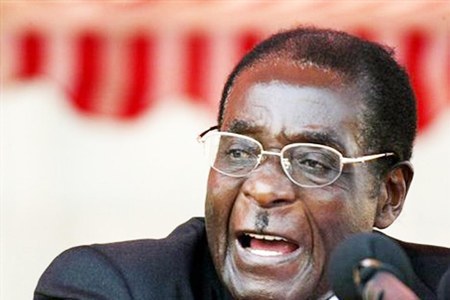
VERY few people believe President Robert Mugabe’s sincerity when he calls for peace among Zimbabweans, especially as the nation prepares for national elections later this year.
BY CAIPHAS CHIMHETE
Since early last year, the 88-year-old leader has been consistent with his message of peace and the people’s right to democratically choose a leader of their choice.
Mugabe has even gone a step further.
A fortnight ago, Mugabe, Prime Minister Morgan Tsvangirai and his deputy Arthur Mutambara signed a political code of conduct that will see leaders of parties being held accountable for their supporters’ violent behaviour.
During the signing ceremony, the three sang in unison: “Peace begins with me: peace begins with you.”
This phrase was popularised by the late Vice-President John Nkomo, when he was head of the organ on National Healing, Reconciliation and Integration, a department tasked with promoting the rule of law and democratic governance.
The endorsement of the code comes in at a time when fears of political violence are rising with the impending general elections slated for later this year. Even at Nkomo’s burial a few weeks ago, Mugabe reiterated his message for peace.
- Chamisa under fire over US$120K donation
- Mavhunga puts DeMbare into Chibuku quarterfinals
- Pension funds bet on Cabora Bassa oilfields
- Councils defy govt fire tender directive
Keep Reading
Listening to his voice and observing gestures, Mugabe seemed to be speaking from his heart unless he was also deceiving his emotions.
Analysts said Mugabe could be resolute on leaving a legacy for himself like the former Tanzanian President Mwalimu Julius Nyerere, who voluntarily left office but continued to influence political direction of his party, Chama Cha Mapinduza and mediating in African conflicts.
As a result, Nyerere became one of Africa’s most respected elder statesmen in the mould of former South African President Nelson Mandela. Nyerere died in 1999, but his legacy lives on. Political science lecturer, Shakespeare Hamauswa said Mugabe could still reconstruct and sanitise his battered political image to become a respected elder statesman.
His image was tarnished by gross human rights violation during election periods and Gukurahundi, where over 20 000 civilians were killed in Matabeleland and Midlands regions in the early 1980s. “If he (Mugabe) manages to translate his words into action, I don’t see why he would not leave a legacy like that of any other African leader,” said Hamauswa.
“What he needs to do is to act on corruption and stop political violence to enable a free and fair election.” Like Mugabe, Nyerere made great strides in health and education during his rule.
However, Nyerere’s socialist policy of community-based farming collectives (Ujamaa) proved disastrous for Tanzania’s economy just like Mugabe’s chaotic land reform programme that destroyed Zimbabwe’s agricultural sector, which was the mainstay of the economy.
But they differed in that Nyerere ignored the trappings of power and knew when to leave office while his dignity was intact.
Mugabe, who turns 89 this month, thinks he is still popular and wants to hang on for another term.
Another political analyst, Ernest Mudzengi, believes Mugabe might still be able leave a good legacy, but Zanu PF will definitely be more divided when he is no longer there.
For several years, the 88-year-old leader has used threats on his colleagues to keep the party “together”.
Mudzengi commended Mugabe for embracing the policy of reconciliation in 1980 as well as uniting of Zanu PF and Zapu in 1987, after years of internal conflict, saying these were some of the plusses for him. “He may leave a legacy,” said Mudzengi. “But will definitely leave Zanu PF more disjointed because it is riddled with factionalism. Without him it will disintegrate.”
Hamauswa said hardliners in Zanu PF were a threat to Mugabe’s peace initiatives because they believed they cannot win elections without violence.
“That is why we still have cases of political violence,” he said. “There are some people who are resisting efforts to end violence.” They also fear prosecution for crimes against humanity if there is a change of government.
But one analyst said Mugabe was confident of winning elections after he dished out shares of foreign-owned companies to locals, including villagers, through a policy indigenisation.
But many people remain unconvinced that Mugabe has changed. They said old habits die hard.
“Mugabe’s call for peace and political tolerance is not genuine because his cronies continue to perpetrate violence against MDCs and he has shielded them from prosecution,” said Phillip Pasirayi, a political analyst.
He said Mugabe must bring to justice all those who abducted, tortured and raped MDC supporters in 2008 before he started preaching peace. The MDC-T claims that at least 200 of its supporters were murdered by Zanu PF activists and state security agents.
But Zanu PF has denied the allegations.
Pasirayi also called for electoral reforms to level the playing field.
“To expect the forthcoming elections to deliver democracy in the absence of these reforms is like expecting apples from a thorny tree,” said Pasirayi.











